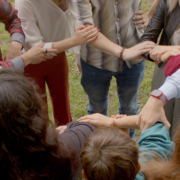I am fortunate to be a part of a wonderful Mastermind Group that meets fortnightly (via Zoom) and shares a deep well of wisdom regularly via an online forum.
In our regular Global Gathering calls – so called because they attract people from all over the world – we talk about a wide range of topics. I always leave these meetings brimming with inspiration and new ideas. Last week was no exception.
Last week, I was struck by a very powerful statement from one of our hosts:
“Politics lives downstream from culture.”
He was quoting a line he had heard from a podcast conversation between Marc Maron & Franklin Leonard, and it struck a chord with him too. And this got us talking and thinking about how this notion may apply to our own work.
Politics reacts and responds and adjusts according to the culture, not the other way around. So if you want to make a change, don’t change your politicians, change your culture.
So who, then, shifts the culture?
You do. I do. We all do.
Environment Dictates Performance
My first connection to this statement was a belief I first shared in my book Serious Fun in which I describe the universal law: environment dictates performance. That is to say, poor performance is highly correlated to a poor environment.
Or, in other words, performance lives downstream from (your) environment.
In the context of programming, this means positive and supportive social interactions – the sort of behaviours that propel groups to succeed and make a difference – all live downstream from the environment in which they live and breathe. Such is the power of intentionally negotiating some form of full value agreement with your group because it signals an intention that you and your group want to finesse their environment, so as to leverage productive relationships and success.
Yes, every person in a group is responsible for the life of the group, but more important is the environment in which this work occurs. Which is where you, the facilitator, teacher, trainer, etc enter the equation.
When you intentionally curate an environment that will help your group to be their best, you are waving the magical wand of facilitation to help them succeed. All groups can do this work, but most groups will need someone like you to help them along the way.
Evidence-Based Research
Indeed, this topic was the focus of an article published by the Harvard Business Review in 2015 that discussed how company culture shaped employee motivation.
You will note that play (ie when you are motivated by the work itself) was one of the three most influential factors that create a high-performance culture (purpose and potential were the other two.)
Behavioural Norms
We are all guilty of blaming “the group” for their poor performance or behaviours – and yes, I get it, there are some groups even their Mums don’t love. But most groups when intentionally guided to create the right environment can elevate themselves to perform to a higher standard.
Success lives downstream from culture. And culture is just a representation of a group’s collective behavioural norms. If something is not working, look to your group’s environment first. Change that, help them to elevate their accepted behaviours, and see if that makes the difference you are looking for.
If you’re interested to learn more about how to curate positive and supportive behavioural norms, click here for a full discussion.
And don’t forget, you can search for dozens of activities within our database. Click the button below to get started.
Search 'Behavioural Norms'
So, what do you think?
Do you agree, does success live downstream from the culture of your group?
Drop a remark in the Comments section below…
No Comments

No Props No Problem
Best-selling book featuring 150+ fun group games & activities. Scan QR codes to access digital content including videos.

NEW – EMOJI Cards
Brand new deck of cards featuring emoji images to help you inspire conversations about emotions, feelings & experiences.
Top Ten Icebreakers & Group Games
Download our free 28-page ebook jam-packed with outrageously fun activity ideas.
Just one more question:
I am interested in…
Politics Lives Downstream from Culture
Share this with friends and colleagues.
Choose a plan that’s right for you
We offer a range of membership plans with no surprises.
Click an option below & discover our simple pricing.

Individual
Click here if you’re a:
- Teacher
- Corporate trainer
- Outdoor educator
- Camp leader
- Youth leader
- Conference organiser
- Therapist/counsellor
Membership Plans

Enterprise
Click here if you represent a:
- School
- Corporation
- Community-based Organisation
Explore plans for
10, 50, 200 or more
potential users
Membership Plans









Original post October 2021, last updated November 2021.